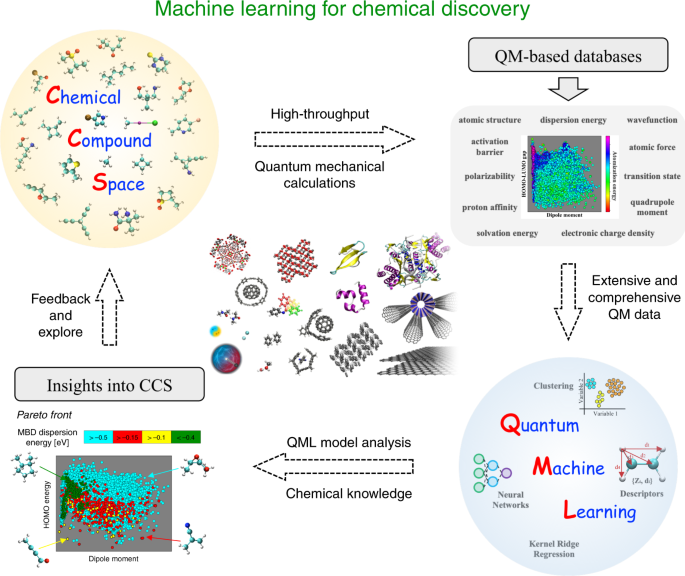Comments
- No comments found

The symbiotic relationship between machine learning and chemistry holds the promise of unlocking insights and accelerating research that was once unimaginable.
Traditional approaches to scientific inquiry are being augmented by AI-driven methodologies, enabling researchers to explore complex molecular interactions and phenomena with unprecedented speed and accuracy.
In this article, we elucidate the transformative potential of machine learning in various domains of chemistry, highlighting its role in expediting drug discovery, materials design, quantum chemistry simulations, reaction prediction, and data-driven insights.
The intricate process of drug discovery is being propelled to new heights through machine learning. By analyzing vast datasets of molecular structures and their interactions, AI algorithms can predict potential drug candidates with enhanced therapeutic properties. This not only accelerates the drug development timeline but also fosters precision medicine by tailoring treatments to individual patients based on their genetic makeup.
Materials scientists are leveraging machine learning to design novel materials with specific properties and functionalities. Through computational modeling and predictive analytics, AI algorithms can identify optimal materials compositions for targeted applications, ranging from energy storage to catalysis. The synergy between machine learning and materials design is transforming the way researchers engineer materials at the atomic and molecular scales.
The computational demands of quantum chemistry simulations have historically posed challenges for researchers.

Machine learning algorithms are bridging this gap by accelerating quantum calculations, making simulations more accessible and efficient. This convergence enables scientists to explore complex molecular behaviors and interactions, shedding light on intricate quantum phenomena.
Predicting chemical reactions is a cornerstone of synthetic chemistry. Machine learning models, trained on extensive reaction databases, are capable of predicting reaction outcomes and proposing optimal reaction conditions. This empowers chemists with insights that expedite reaction discovery, streamline synthesis planning, and reduce experimental trial and error.
Machine learning's ability to process and analyze vast amounts of data is revolutionizing the way chemists glean insights. By uncovering hidden correlations, trends, and patterns within datasets, AI algorithms enable data-driven decision-making in research and innovation. This data-centric approach guides researchers toward novel hypotheses and discoveries.
The fusion of machine learning and chemistry is ushering in a new era of scientific discovery. The power of AI to analyze data, predict molecular behavior, and simulate complex interactions is transforming chemistry into a data-intensive and predictive discipline. As machine learning algorithms continue to evolve, the synergy between these two domains promises to unlock unprecedented insights, accelerate research timelines, and fuel innovations that shape the future of scientific exploration.
Leave your comments
Post comment as a guest